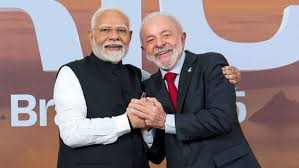BRICS declaration condemns US, Israel strikes on Iran, war in Gaza

PM Modi Meets President Lula in Rio de Janeiro, Calls for Deeper BRICS Unity and South-South Cooperation
Rio de Janeiro, Brazil (July 7, 2025):
In a significant diplomatic engagement, Indian Prime Minister Narendra Modi met with Brazilian President Luiz Inácio Lula da Silva on Sunday in Rio de Janeiro. The meeting came on the sidelines of the high-profile BRICS summit and served to reaffirm the strategic partnership between the two major economies of the Global South.
The discussions, held in a cordial and forward-looking atmosphere, covered a range of global and regional issues — from BRICS cooperation to multilateral reforms and enhanced bilateral trade. Both leaders underscored the importance of working together to strengthen the voice of developing countries in international forums.
Building Momentum for a Multipolar World
During the talks, Prime Minister Modi emphasized that India and Brazil share a common worldview rooted in respect for sovereignty, sustainable development, and inclusive growth. He stated that their cooperation, especially under the BRICS framework, is essential for ushering in a fairer global order.
“India and Brazil are natural allies in advocating for the Global South. Our cooperation within BRICS is central to building a more democratic and multipolar world,” Modi remarked after the meeting.
President Lula echoed the sentiment, stating that Brazil values its enduring partnership with India and is committed to jointly addressing global challenges. He reaffirmed Brazil’s support for a reformed multilateral system that gives emerging economies a greater say in global governance.
Focus on Economic Cooperation and Trade Expansion
Economic collaboration formed a key component of the bilateral conversation. Both leaders expressed interest in expanding trade volumes, which have shown steady growth in recent years. With complementary economies — India’s strengths in IT and pharmaceuticals and Brazil’s agricultural and energy resources — the two countries see vast potential for cooperation.
Officials discussed possibilities for enhancing trade in sustainable agriculture, renewable energy, and digital technologies. They also explored new opportunities for joint ventures, technology sharing, and logistics connectivity between South Asia and South America.
Brazilian officials indicated that increased Indian investments in Brazil’s infrastructure and manufacturing sectors would be welcome, while India is interested in long-term agricultural imports and ethanol cooperation.
Strengthening BRICS and Championing the Global South
This year’s BRICS summit, hosted by Brazil, has taken on added significance amid growing global polarization. With the inclusion of new member countries such as Egypt, Ethiopia, Iran, and the UAE, BRICS is looking to reassert its relevance in shaping the future of international cooperation.
Modi and Lula discussed ways to enhance internal BRICS mechanisms, including financial cooperation through the New Development Bank (NDB), a greater focus on local currency trade, and a unified voice on key international issues such as climate change, digital governance, and peacekeeping.
In particular, both leaders stressed the need for BRICS to champion the interests of the Global South. They called for greater development financing, fairer trade rules, and reforms in institutions like the United Nations Security Council and the World Trade Organization.
Cultural Ties and People-to-People Exchange
Beyond political and economic issues, Modi and Lula also talked about deepening cultural and educational exchanges. India and Brazil share rich and diverse cultures, and both leaders acknowledged the role of soft diplomacy in building lasting ties.
India’s Bollywood films, yoga, and Ayurveda have gained popularity in Brazil, while Brazilian music, football, and Carnival culture continue to find admirers in India. Educational collaboration, student exchange programs, and tourism promotion were discussed as part of long-term cultural outreach.
A Historic Bond Revived
Sunday’s meeting was not just another diplomatic formality — it also revived the historic connection between the two democracies. Brazil was one of the first Latin American countries to establish diplomatic ties with independent India, and since then, the relationship has steadily grown.
In recent years, Brazil and India have found increasing common ground in global economic forums such as G20 and the World Economic Forum, as well as in climate negotiations and trade blocs.
President Lula, known for his strong stance on global equity and social justice, has often spoken about the need to reduce dependency on Western-centric systems — a vision that aligns with Modi’s advocacy for an “Atmanirbhar Bharat” and multipolar cooperation.
Looking Ahead: India–Brazil Partnership in a Changing World
As the world faces rising geopolitical tensions, shifting power dynamics, and growing economic uncertainty, the India–Brazil partnership within BRICS offers an alternative vision — one based on equity, mutual respect, and collaborative growth.
The Sunday meeting in Rio was a reminder that large democracies from the Global South can work together to shape the future of the international order.
With growing convergence on strategic issues, robust trade opportunities, and cultural warmth, the India–Brazil bond — once a promising friendship — is now shaping into a crucial pillar of the emerging multipolar world.






